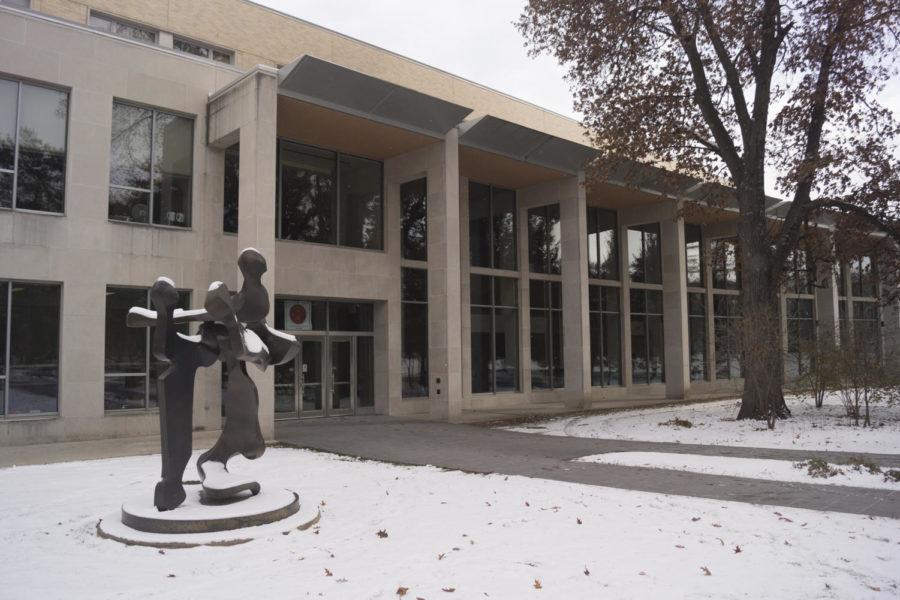College of Business celebrates 30th Anniversary
Michael Rowley/Iowa State Daily
The College of Business jumped up double-digits in the U.S. News and World Report rankings this year.
November 21, 2014
Only 30 years ago, Iowa State University’s College of Business was just a dream.
The reality didn’t come true until July 1, 1984, when the College of Business Administration was officially formed.
Record enrollment for the university was established that year with 26,321 students, according to the ISU Fact Book. Iowa State’s first Bachelor of Business Administration degrees were awarded to 205 of those students that fall semester.
Paula Morrow, university professor in management, began teaching at Iowa State in 1978. She remembers the conception of the college.
“When I first started, we were the Department of Industrial Administration within the College of, what was called then, Sciences and Humanities, which is today’s Liberal Arts and Sciences,” Morrow said. “Becoming a college was [an] important milestone for us.”
Morrow believed becoming a college helped convey to the outside world that business had the same stature as the other educational units on campus. She said the college became “analogous to engineering, agriculture or human sciences.”
Jim Kurtenbach, associate professor of accounting, too remembered a time before the College of Business.
“I graduated in ‘80, four years before we became a college,” Kurtenbach said.
He graduated from the Department of Industrial Administration with an emphasis on technology and engineering. He said he felt fortunate with his opportunities at Iowa State, even though he was never a student in the College of Business. He was able to take the very first management information system courses taught at Iowa State in the late 1970s.
“For me ISU, the then Department of Industrial Administration and today, the College of Business, are institutions I’m very proud to have been associated with all these years,” Kurtenbach said of his 23 years of involvement with the university.
Although Kurtenbach had no complaints about his education, Morrow said she believes the changes made to the institution were necessary.
The most important impact becoming a college had on the institution was the name recognition for students on their diplomas and resumes, Morrow said.
“It’s much more communicative than industrial administration,” she said.
The establishment gained the school the separate majors of accounting, marketing, finance and management.
Morrow said it meant students no longer had to compromise for a major in industrial administration with a specialization in one of those areas.
“The facilities were not very suitable for business education,” she also said.
She said today, the college’s business-teaching environment, with its tiered classrooms, state of the art technology and interactive teaching methods, is more representative of corporate experiences.
“Our faculty and staff has grown commensurately with our undergraduate population,” Morrow said. “[Some of the success comes from] the professional advisers and then the faculty being able to carve out more time to have more in-depth conversations with students.”
Kurtenbach said, unlike Morrow, he doesn’t think so much about the aspects that have changed.
“I tend to think more about the things that have stayed the same as the college has grown very large,” he said. “We have faculty [who] are extremely focused on students and the student experience.”
Kurtenbach said the memories he’s made with the college has stuck with him for years.
“The memories that I have all resonate around both the faculty and the students being connected on a journey together,” he said. “The best memories I have as a student were of faculty who would actually sit down and talk and look at career opportunities. And today my most memorable experiences revolve around the students and the relationships I have kept.”
Kurtenbach said building connections while in college are key.
“The relationships that you build and the connections that you keep strong, because we’re all on this journey together, really defines ISU College of Business,” he said.
Morrow related to Kurtenbach’s feelings about faculty-student connections.
“I’ve always tried to connect with each student individually,” Morrow said.
Morrow said it’s sometimes difficult to connect when the classes are large, but she always had a policy of coming to campus every day and she has encouraged students to drop by the office without appointments.
She said she always worked to make herself accessible to her students. Morrow said that in the 36 years she has been teaching, the college has been accessible to her as well.
“The College of Business has been extremely supportive in other facets of my job which students are perhaps not so aware of, which is the research expectations,” she said.
The institution provides professors with financial and research support, such as graduate assistants, computers and software.
“There’s endless opportunities in front of us — there’s a wealth of experience behind us,” Kurtenbach said. “The college, and the students who make up the college, are only going to make it stronger as we go through the next decades.”
While the College of Business is celebrating its 30th anniversary this year, they are also celebrating the 10-year anniversary of their facility, the Gerdin Building. The building was made possible by a personal monetary donation from Russ Gerdin and his family.
“I think we are really indebted to them,” Morrow said. “Without Mr. Gerdin’s generosity, this building would have never occurred. We are continually thrilled to have it.”

















